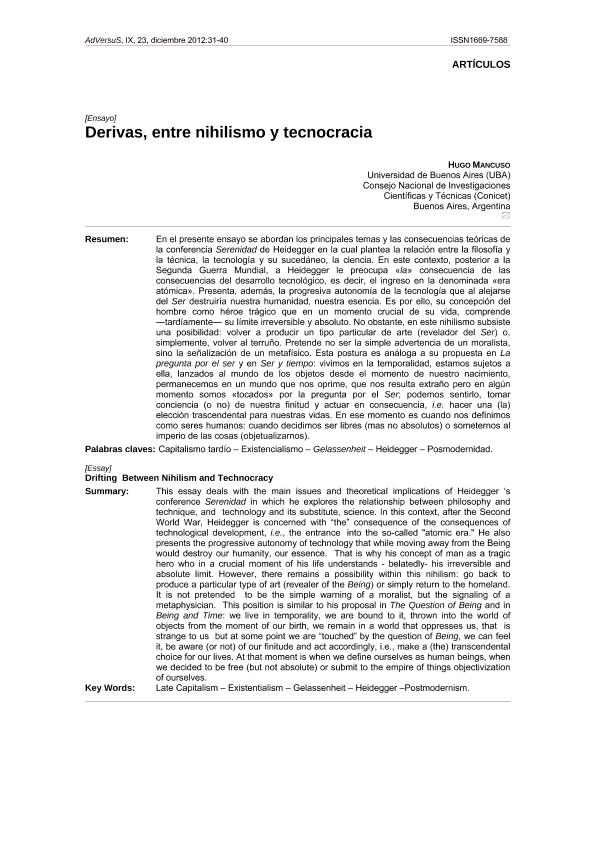Mostrar el registro sencillo del ítem
dc.contributor.author
Mancuso, Hugo Rafael

dc.date.available
2023-06-09T16:50:34Z
dc.date.issued
2012-12
dc.identifier.citation
Mancuso, Hugo Rafael; Derivas, entre nihilismo y tecnocnocracia; Istituto Italo-argentino di Ricerca Sociale; Adversus; 9; 23; 12-2012; 31-40
dc.identifier.issn
1669-7588
dc.identifier.uri
http://hdl.handle.net/11336/200131
dc.description.abstract
En el presente ensayo se abordan los principales temas y las consecuencias teóricas de la conferencia Serenidad de Heidegger en la cual plantea la relación entre la filosofía y la técnica, la tecnología y su sucedáneo, la ciencia. En este contexto, posterior a la Segunda Guerra Mundial, a Heidegger le preocupa «la» consecuencia de las consecuencias del desarrollo tecnológico, es decir, el ingreso en la denominada «era atómica». Presenta, además, la progresiva autonomía de la tecnología que al alejarse del Ser destruiría nuestra humanidad, nuestra esencia. Es por ello, su concepción del hombre como héroe trágico que en un momento crucial de su vida, comprende ―tardíamente― su límite irreversible y absoluto. No obstante, en este nihilismo subsiste una posibilidad: volver a producir un tipo particular de arte (revelador del Ser) o, simplemente, volver al terruño. Pretende no ser la simple advertencia de un moralista, sino la señalización de un metafísico. Esta postura es análoga a su propuesta en La pregunta por el ser y en Ser y tiempo: vivimos en la temporalidad, estamos sujetos a ella, lanzados al mundo de los objetos desde el momento de nuestro nacimiento, permanecemos en un mundo que nos oprime, que nos resulta extraño pero en algún momento somos «tocados» por la pregunta por el Ser; podemos sentirlo, tomar conciencia (o no) de nuestra finitud y actuar en consecuencia, i.e. hacer una (la) elección trascendental para nuestras vidas. En ese momento es cuando nos definimos como seres humanos: cuando decidimos ser libres (mas no absolutos) o someternos al imperio de las cosas (objetualizarnos).
dc.description.abstract
This essay deals with the main issues and theoretical implications of Heidegger ‘s conference Serenidad in which he explores the relationship between philosophy and technique, and technology and its substitute, science. In this context, after the Second World War, Heidegger is concerned with “the” consequence of the consequences of technological development, i.e., the entrance into the so-called "atomic era." He also presents the progressive autonomy of technology that while moving away from the Being would destroy our humanity, our essence. That is why his concept of man as a tragic hero who in a crucial moment of his life understands - belatedly- his irreversible and absolute limit. However, there remains a possibility within this nihilism: go back to produce a particular type of art (revealer of the Being) or simply return to the homeland. It is not pretended to be the simple warning of a moralist, but the signaling of a metaphysician. This position is similar to his proposal in The Question of Being and in Being and Time: we live in temporality, we are bound to it, thrown into the world of objects from the moment of our birth, we remain in a world that oppresses us, that is strange to us but at some point we are “touched” by the question of Being, we can feel it, be aware (or not) of our finitude and act accordingly, i.e., make a (the) transcendental choice for our lives. At that moment is when we define ourselves as human beings, when we decided to be free (but not absolute) or submit to the empire of things objectivization of ourselves.
dc.format
application/pdf
dc.language.iso
spa
dc.publisher
Istituto Italo-argentino di Ricerca Sociale
dc.rights
info:eu-repo/semantics/openAccess
dc.rights.uri
https://creativecommons.org/licenses/by-nc-sa/2.5/ar/
dc.subject
CAPITALISMO TARDIO
dc.subject
EXISTENCIALISMO
dc.subject
POSMODERNIDAD
dc.subject.classification
Filosofía, Historia y Filosofía de la Ciencia y la Tecnología

dc.subject.classification
Filosofía, Ética y Religión

dc.subject.classification
HUMANIDADES

dc.title
Derivas, entre nihilismo y tecnocnocracia
dc.title
Drifting Between Nihilism and Technocracy
dc.type
info:eu-repo/semantics/article
dc.type
info:ar-repo/semantics/artículo
dc.type
info:eu-repo/semantics/publishedVersion
dc.date.updated
2023-06-06T13:33:48Z
dc.journal.volume
9
dc.journal.number
23
dc.journal.pagination
31-40
dc.journal.pais
Argentina

dc.journal.ciudad
Ciudad Autónoma de Buenos Aires
dc.description.fil
Fil: Mancuso, Hugo Rafael. Consejo Nacional de Investigaciones Científicas y Técnicas; Argentina. Universidad de Buenos Aires; Argentina
dc.journal.title
Adversus
dc.relation.alternativeid
info:eu-repo/semantics/altIdentifier/url/http://www.adversus.org/indice/nro-23/articulos/IX2303.pdf
Archivos asociados
